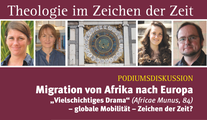Migration from Africa to Europe – Panel Discussion
 The question of whether people who make their way to Europe from the African continent should be accepted or rejected, how the refugee boats and rescue ships in the Mediterranean should be dealt with, and what policy the EU should pursue with regard to Africa is an enormous source of emotion, even heated. The fact that many people have been drowning trying to cross the Mediterranean for years caused great consternation a few years ago, but now hardly touches anyone. And the many refugees who find refuge in various countries within Africa are completely lost sight of.In order to discuss the topic of “Migration from Africa to Europe” in the most differentiated way possible, the Center for Intercultural Theology and the Study of Religions invited to a panel discussion as part of the faculty event series “Theology under the Sign of the Times”, in which a number of experts participated:
The question of whether people who make their way to Europe from the African continent should be accepted or rejected, how the refugee boats and rescue ships in the Mediterranean should be dealt with, and what policy the EU should pursue with regard to Africa is an enormous source of emotion, even heated. The fact that many people have been drowning trying to cross the Mediterranean for years caused great consternation a few years ago, but now hardly touches anyone. And the many refugees who find refuge in various countries within Africa are completely lost sight of.In order to discuss the topic of “Migration from Africa to Europe” in the most differentiated way possible, the Center for Intercultural Theology and the Study of Religions invited to a panel discussion as part of the faculty event series “Theology under the Sign of the Times”, in which a number of experts participated:
- Tamino Böhm, Head of Aerial Reconnaissance Operations at Sea-Watch
- Katrin Gänsler, West Africa correspondent for taz, Deutsche Welle, Catholic News Agency and STANDARD
- Tanja Kleibl, Professor of Social Work at Augsburg University of Applied Sciences and freelance consultant for Misereor
- Sophia Kremser, PhD student at the Faculty of Theology in the field of “Theology, Intercultural and Study of Religions” and chaplain for deportation
- Marco Moerschbacher, Africa consultant at the Missiological Institute Missio in Aachen and consultant in the basic department of Missio Aachen
The panel, moderated by Franz Gmainer-Pranzl, presented different perspectives on the challenge of “migration from Africa to Europe” and dealt with the causes of this migration movement, not least with the question of whether the responsibility for it is to be sought in Africa or rather in Europe. Many engaging audience contributions and questions contributed to a lively discussion. For the Center for Intercultural Theology and the Study of Religions, which focuses on Africa in its research and teaching, this impulse was an important contribution to a differentiated awareness of the problem and to an interdisciplinary examination of a pressing “sign of the times”.




